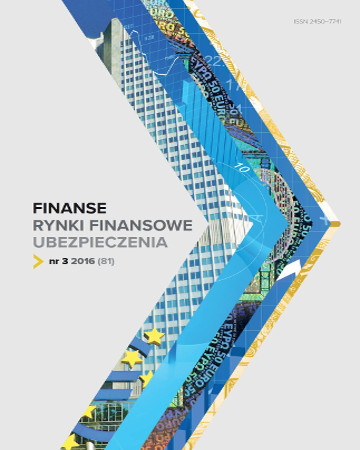
ISSN: 2450-7741
eISSN: 2300-4460
OAI
DOI: 10.18276/frfu.2016.4.82/1-56


Issue archive /
4/2016
Wpływ opcji na akcje na skłonność menedżerów do podejmowania działalności badawczo-rozwojowej w perspektywie behawioralnej teorii agencji
(The Impact of Stock Options on the Manager Propensity to Undertake Research and Development Activities in the Behavioral Agency Theory Perspective)
| Authors: | Ewelina Niedzielska |
| Keywords: | agency theory behavioral agency theory stock options research and development manager |
| Data publikacji całości: | 2016 |
| Page range: | 14 (677-690) |
Abstract
Purpose – The aim of this article is to identify contexts in which there are possibilities to include stock options in the structure of manager’s compensation. The research will be based on the current literature and will be conducted from the angle of engaging in research and development activities. Design/methodology/approach – Literary studies, based on the current state of knowledge of the impact of stock options compensation on taking the long-term projects by managers. Findings – Empirical results, previously proposed in the literature studies, reveal a difficulty in demonstrating the direct impact of stock options compensation on engaging in research and development activities by managers. Researchers associated with the behavioral agency theory are looking for factors moderating the above relation. The article presents the results of studies indicating two of these factors: the profitability of the company and stage of manager’s tenure. Originality/value – The assumption which is commonly found in the literature agency indicates a positive impact of stock options compensation on the manager’s willingness to engage in long-term projects, such as R&D. This article indicates that this assumption applies only in certain conditions, i.e. at the appropriate level of performance of the company and the appropriate phase of manager’s tenure. In addition, the author analyzes this problem from the perspective of behavioral finance, which is still not common in Poland.
Download file
Article file
Bibliography
| 1. | Borkowska S. (2012). Skuteczne strategie wynagrodzeń – tworzenie i zastosowani. Warszawa: Oficyna a Wolters Kluwer business. |
| 2. | Ćwik K. (2011). Efektywność nadzoru właścicielskiego a funkcjonowanie grupy kapitałowej. Nauki o zarządzaniu, 8, 45–56. |
| 3. | Deloitte Polska (2014). Badania i rozwój w Polsce. Raport 2014. Warszawa: Deloitte Polska. |
| 4. | Deutsch Y., Keil T., Laamanen T. (2010). A dual agency view of board compensation: the joint effects of outside director and CEO stock options on firm risk. Strategic Management Journal, 32, 212–227. |
| 5. | Gad J. (2011). Rachunkowość w procesie nadzoru w spółkach publicznych. Łódź: Wydawnictwo Uniwersytetu Łódzkiego. |
| 6. | Kisielnicki J. (2013). Zarządzanie projektami badawczo-rozwojowymi. Warszawa: Oficyna a Wolters Kluwer business. |
| 7. | Martin G., Gomez-Mejia L., Wiseman R. (2013). Executive stock options as mixed gambles: revisiting the behavioral agency model. Academy of Management Journal, 2 (56), 451–472. |
| 8. | Ponikowski H. (2011). Polityka regionalna w Polsce w ujęciu teorii agencji. W: Z. Pisz (red.), Polityka ekonomiczna (s. 558–566). Wrocław: Uniwersytet Ekonomiczny we Wrocławiu. |
| 9. | Postrach K. (2010). Teoria agencji a teoria stewarda w nadzorze korporacyjnym. W: P. Urbanek (red.), Nadzór korporacyjny w warunkach kryzysu gospodarczego (s. 287–296). Łódź: Wydawnictwo Uniwersytet Łódzkiego. |
| 10. | Sanders G. (2001). Behavioral responses of CEO’s to stock ownership and stock option pay. Academy of Management Journal, 3 (44), 477–492. |
| 11. | Tversky A., Kahneman D. (1983). Choices, Values, and Frames. American Psychologist, 4 (39), 341–350. |
| 12. | Tversky A., Kahneman D. (1992). Advances in Prospect Theory: Cumulative Representation of Uncertainty. Journal of Risk and Uncertainty, 5, 297–323. |
| 13. | Tversky A., Kahneman D. (1979). Prospect Theory: An Analysis of Decision Under Risk. Econometrica, 2 (47), 263–292. |
| 14. | Tversky A., Kahneman D. (1986). Rational Choice and the Framing of Decisions. Journal of Business, 4 (59), 251–278. |
| 15. | Urbanek P. (2014). Problem agencji w warunkach zdecentralizowanego modeli zarządzania uczelnią publiczną. Prace Naukowe Uniwersytetu Ekonomicznego we Wrocławiu, 343, 550–558. |
| 16. | Wiseman R., Gomez-Mejia L. (1998). A behavioral agency model of managerial risk taking. Academy of Management Review, 1 (23), 133–153. |
| 17. | Woźniak J. (2012). Współczesne systemy motywacyjne. Teoria i praktyka. Warszawa: Wydawnictwa Profesjonalne PWN. |
| 18. | Wu J., Tu R. (2007). CEO stock option pay and R&D spending: a behavioral agency explanation. Journal of Business Research, 60, 482–492. |
| 19. | Założenia polityki naukowej, naukowo-technicznej i innowacyjnej państwa do 2020 r. (2004). Warszawa: Ministerstwo Nauki i Informatyzacji. |
| 20. | Zona F. (2016). Agency models in different stages of CEO tenure: The effects of stockoptions and board independence on R&D investment. Research Policy, 45, 560–575. |
| 21. | Zygmunt A. (2015). Poziom nakładów na B + R w Polsce na tle pozostałych państw unii europejskiej. Prace Naukowe Uniwersytetu Ekonomicznego we Wrocławiu, 393, 163–171. |